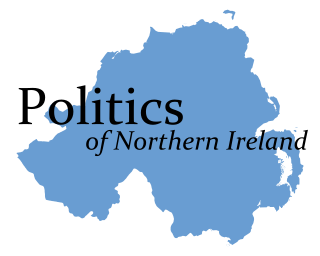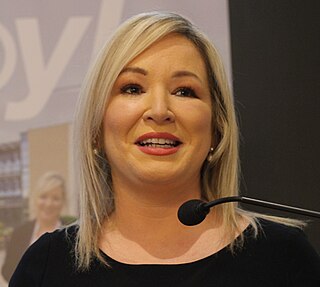The Social Democratic and Labour Party is a social-democratic and Irish nationalist political party in Northern Ireland. The SDLP currently has seven members in the Northern Ireland Assembly (MLAs) and two members of Parliament (MPs) in the House of Commons of the United Kingdom.

Northern Ireland is one of the four countries of the United Kingdom, situated in the north-east of the island of Ireland. It was created as a separate legal entity on 3 May 1921, under the Government of Ireland Act 1920. The new autonomous Northern Ireland was formed from six of the nine counties of Ulster: four counties with unionist majorities – Antrim, Armagh, Down, and Derry/Londonderry – and two counties with slight Irish nationalist majorities – Fermanagh and Tyrone – in the 1918 General Election. The remaining three Ulster counties with larger nationalist majorities were not included. In large part unionists, at least in the north-east, supported its creation while nationalists were opposed.

The Northern Ireland Assembly, often referred to by the metonym Stormont, is the devolved legislature of Northern Ireland. It has power to legislate in a wide range of areas that are not explicitly reserved to the Parliament of the United Kingdom, and to appoint the Northern Ireland Executive. It sits at Parliament Buildings at Stormont in Belfast.
The Northern Ireland Executive is the devolved government of Northern Ireland, an administrative branch of the legislature – the Northern Ireland Assembly. It is answerable to the assembly and was initially established according to the terms of the Northern Ireland Act 1998, which followed the Good Friday Agreement. The executive is referred to in the legislation as the Executive Committee of the assembly and is an example of consociationalist ("power-sharing") government.
The Sunningdale Agreement was an attempt to establish a power-sharing Northern Ireland Executive and a cross-border Council of Ireland. The agreement was signed at Northcote House in Sunningdale Park, located in Sunningdale, Berkshire, on 9 December 1973. Unionist opposition, violence and a general strike caused the collapse of the agreement in May 1974.

The 2007 Northern Ireland Assembly election was held on Wednesday, 7 March 2007. It was the third election to take place since the devolved assembly was established in 1998. The election saw endorsement of the St Andrews Agreement and the two largest parties, the Democratic Unionist Party (DUP) and Sinn Féin, along with the Alliance Party, increase their support, with falls in support for the Ulster Unionist Party (UUP) and the Social Democratic and Labour Party (SDLP).

The 1973 elections to the Northern Ireland Assembly took place following the publication of the British government's white paper Northern Ireland Constitutional Proposals which proposed a 78-member Northern Ireland Assembly, elected by proportional representation. The proposals for a Northern Ireland Assembly contained in the White Paper were put into effect through the Northern Ireland Assembly Act 1973 in May 1973.

The Northern Ireland Assembly was a legislative assembly set up by the Government of the United Kingdom on 3 May 1973 to restore devolved government to Northern Ireland with the power-sharing Northern Ireland Executive made up of unionists and nationalists. It was dissolved in March 1975.

The First Minister and deputy First Minister of Northern Ireland are the joint heads of government of Northern Ireland, leading the Northern Ireland Executive and with overall responsibility for the running of the Executive Office. Despite the titles of the two offices, the two positions have the same governmental power, resulting in a duumvirate; the deputy First Minister, customarily spelled with a lowercase d, is not subordinate to the First Minister. Created under the terms of the 1998 Good Friday Agreement, both were initially nominated and appointed by members of the Northern Ireland Assembly on a joint ticket by a cross-community vote, under consociational principles. That process was changed following the 2006 St Andrews Agreement, such that the First Minister now is nominated by the largest party overall, and the deputy First Minister is nominated by the largest party from the next largest community block.
A power-sharing Northern Ireland Executive was formed following the Northern Ireland Assembly elections of 1973. The executive served as the devolved government of Northern Ireland from 1 January 1974 until its collapse on 28 May 1974.
A cross-community vote or cross-community support is a form of voting used in the Northern Ireland Assembly according to the provisions of the 1998 Good Friday Agreement. It requires the support of both main communities in Northern Ireland, in other words majority of unionists and the majority of nationalist members of the Assembly. Among other reasons, it arises when the petition of concern procedure is invoked.

The 2016 Northern Ireland Assembly election was held on Thursday, 5 May 2016. It was the fifth election to take place since the devolved assembly was established in 1998. 1,281,595 individuals were registered to vote in the election. Turnout in the 2016 Assembly election was 703,744 (54.9%), a decline of less than one percentage point from the previous Assembly Election in 2011, but down 15 percentage points from the first election to the Assembly held in 1998.

Since 1998, Northern Ireland has devolved government within the United Kingdom. The government and Parliament of the United Kingdom are responsible for reserved and excepted matters. Reserved matters are a list of policy areas, which the Westminster Parliament may devolve to the Northern Ireland Assembly at some time in future. Excepted matters are never expected to be considered for devolution. On all other matters, the Northern Ireland Executive together with the 90-member Northern Ireland Assembly may legislate and govern for Northern Ireland. Additionally, devolution in Northern Ireland is dependent upon participation by members of the Northern Ireland Executive in the North/South Ministerial Council, which co-ordinates areas of co-operation between Northern Ireland and the Republic of Ireland.
The fourth Northern Ireland Assembly was the unicameral devolved legislature of Northern Ireland following the 2011 assembly election on 5 May 2011. This iteration of the elected Assembly convened for the first time on 12 May 2011 in Parliament Buildings in Stormont, and ran for a full term.
In Northern Ireland, the Leader of the Opposition is the leader of the largest eligible political party in the Northern Ireland Assembly that is not in the Northern Ireland Executive. The position is currently held by Matthew O'Toole of the Social Democraic and Labour Party.

The 2017 Northern Ireland Assembly election was held on Thursday, 2 March 2017. The election was held to elect members (MLAs) following the resignation of deputy First Minister Martin McGuinness in protest over the Renewable Heat Incentive scandal. McGuinness' position was not filled, and thus by law his resignation triggered an election.
This is a list of the members of the fifth Northern Ireland Assembly, the unicameral devolved legislature of Northern Ireland. Members of the Legislative Assembly (MLAs) elected on 5 May 2016 or subsequently co-opted are listed by party and by constituency.

The 2022 Northern Ireland Assembly election was held on 5 May 2022. It elected 90 members to the Northern Ireland Assembly. It was the seventh assembly election since the establishment of the assembly in 1998. The election was held three months after the Northern Ireland Executive collapsed due to the resignation of the First Minister, Paul Givan (DUP), in protest against the Northern Ireland Protocol.

New Decade, New Approach (NDNA) is a 9 January 2020 agreement which restored the government of the Northern Ireland Executive after a three-year hiatus triggered by the Renewable Heat Incentive scandal. It was negotiated by Secretary of State for Northern Ireland Julian Smith and Irish Tánaiste Simon Coveney.

A Northern Ireland Assembly election will be held to elect 90 members to the Northern Ireland Assembly by 6 May 2027.












